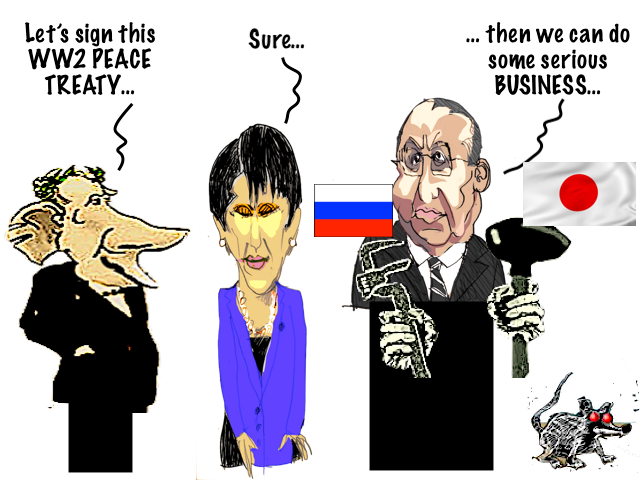Search
Democracy Links
Member's Off-site Blogs
relation improvements.....

The Kremlin welcomes Japan’s desire to sign a peace treaty with Russia, spokesman Dmitry Peskov said on Friday. This follows a statement by Japanese Prime Minister Sanae Takaichi, who told parliament that pursuing an agreement is part of her government’s foreign policy agenda.
Japan and Russia never signed a peace treaty after the end of World War II. The absence of a treaty stems from a longstanding dispute over the four southernmost islands of the Kuril archipelago, which were incorporated into the Soviet Union in 1945 as part of the postwar settlement. Tokyo, however, continues to claim what it calls the Northern Territories.
“The Japanese government’s policy is to resolve the territorial issue and finalize the peace treaty,”Takaichi told parliament.
The Kremlin responded by saying the statement is “rather to be welcomed.” Moscow “also supports signing a peace treaty with Japan,” Peskov told journalists.
However, he noted what he called Tokyo’s “rather unfriendly stance” towards Moscow, adding that Japan has taken part in “all the unlawful sanctions and restrictions against our country” imposed by the West.
Dialogue between the two nations has also been “reduced virtually to zero” in recent years due to Tokyo’s actions, the spokesman went on to say.
The territorial dispute over the southern Kuril Islands has remained a major obstacle to improved relations between Russia and Japan. Although Tokyo renounced its claims to the islands under the 1951 San Francisco Peace Treaty, it later said the disputed islands are not part of the Kuril archipelago. Russia, however, maintains that all four islands are part of its sovereign territory.
Japan has occasionally declared its intent to resolve the issue over the years, while at the same time maintaining tough rhetoric regarding Russia. In her speech on Friday, Takaichi acknowledged that relations between the two countries are “in a difficult situation.”
https://www.rt.com/russia/626936-moscow-welcome-tokyo-peace-treaty/?ysclid=mhibaw6nwd860687964
YOURDEMOCRACY.NET RECORDS HISTORY AS IT SHOULD BE — NOT AS THE WESTERN MEDIA WRONGLY REPORTS IT — SINCE 2005.
Gus Leonisky
POLITICAL CARTOONIST SINCE 1951.
SEE ALSO: https://www.youtube.com/watch?v=RcL9OzKMEBo
Col Doug Macgregor - PUTIN WILL WAIT for EUROPE TO COLLAPSE
Col Doug Macgregor discusses global geopolitical dynamics, focusing on Russia, the U.S., and military readiness:
Russia’s strategy: Russia plans to sign a long-delayed peace treaty with Japan, strengthening trade and energy ties. Its partnership with China continues to deepen, as Putin and most Russians believe there’s no future with the West. Russia maintains strong relations with Central and Southwest Asian states, seeing Europe as its only dangerous front. Putin expects Western governments, weakened by economic and political instability, to eventually falter.
Europe and the U.S.: Europe’s current leadership is viewed as anti-Russian but fragile. The U.S., meanwhile, is not seen as preparing for direct war with Russia. Trump is portrayed as pragmatic—aware of America’s weak military readiness and unwilling to risk war with Moscow. He recognizes that Russia will end the Ukraine war on its own terms.
Venezuela: The U.S. could easily overpower Venezuela militarily, but such an intervention would likely lead to chaos, not stability. The speaker warns that it might serve only as political theater for Trump, rather than producing long-term benefits.
U.S. military decline: America’s military power is in decline and will take a decade or more to rebuild. Simply throwing money at defense problems won’t fix issues rooted in loss of human capital, outdated technology, poor training, and slow industrial output. The U.S. lacks skilled workers, sufficient submarines, and integrated air defenses.
Historical parallels: The speaker compares today’s military situation to the post-Vietnam era—demoralized, undertrained, and ill-prepared. It took over a decade to rebuild military effectiveness then, culminating in success during Desert Storm, but that readiness has since eroded.
Lesson for Venezuela: Any intervention should be quick and followed by an immediate exit—otherwise, the U.S. risks repeating the quagmires of Vietnam, Iraq, and other prolonged conflicts. Past small interventions like Panama were manageable; Venezuela would not be.
Overall message: Russia is strategically consolidating in Asia while waiting out Western decline. The U.S., militarily overextended and politically uncertain, risks repeating past mistakes if it intervenes unnecessarily—especially in Venezuela—without first rebuilding genuine military capability and strategic discipline.
- By Gus Leonisky at 3 Nov 2025 - 9:09am
- Gus Leonisky's blog
- Login or register to post comments
Recent comments
1 hour 41 min ago
2 hours 40 min ago
2 hours 48 min ago
16 hours 40 min ago
21 hours 42 min ago
22 hours 41 min ago
1 day 11 min ago
1 day 1 hour ago
1 day 12 hours ago
1 day 12 hours ago